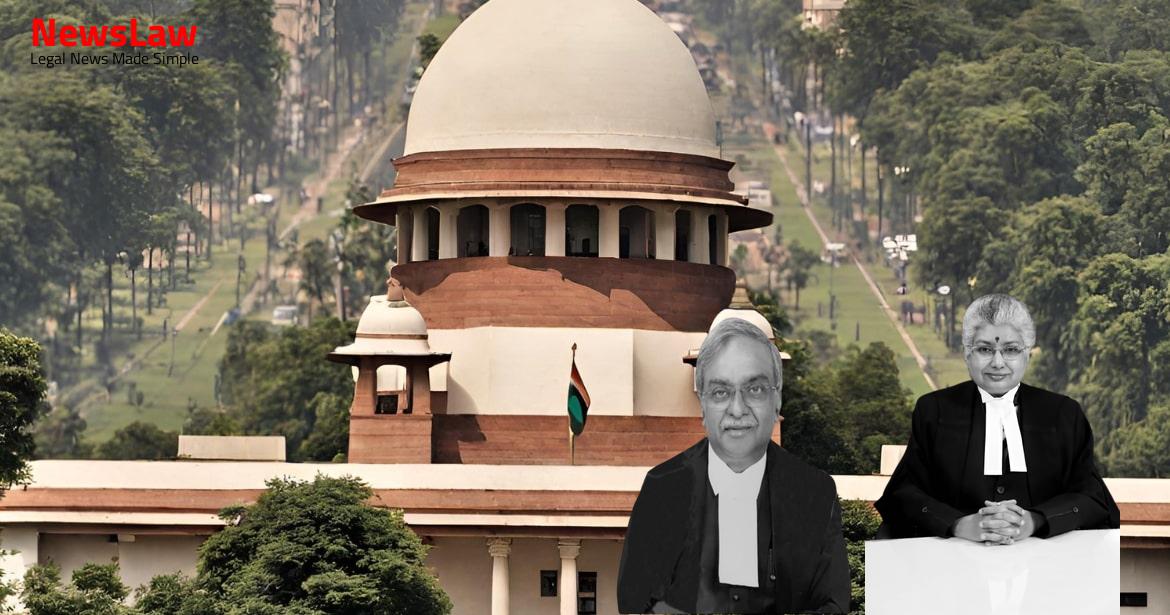In a significant Supreme Court decision, the matter of compassionate appointment dispute was resolved. The case involved the family of Shri Jagdish Raj, who was a former employee of a bank. The court’s ruling sheds light on the intricacies of compassionate appointments and the authority of banks in such matters. Learn more about this case and its impact on similar situations in the legal landscape.
Facts
- Jagdish Raj, husband of respondent No.1 and father of respondent No.2, was working as a Clerk-cum-Shroff in the appellant-Bank until his demise on 15.1.2004.
- His gross monthly salary at the time of his death was Rs.16,486.60.
- After his demise, benefits totaling Rs.5,45,872 were calculated and sanctioned for his family.
- Due to deductions for staff housing and vehicle loans, a net payment of Rs.2,99,672 was made to the family.
- In addition to the net payment, a monthly pension of Rs.5,574.12 was granted to the family.
Also Read: Supreme Court Judgment on Single Till Mechanism for HRAB Calculation: A Comprehensive Analysis
Arguments
- Respondent No.1 was already employed and earning a salary at the time of her husband’s demise.
- The appellant-Bank later discovered that Respondent No.1 was employed.
- The dispute arises from an application made on behalf of the son, seeking compassionate employment due to the demise of Shri Jagdish Raj.
- The application was made on 24.1.2004 when the son was a minor.
Analysis
- The applicable scheme for compassionate appointment was the one in force on the date of the employee’s death.
- The new scheme brought into force did not change the terms of the previous scheme, making the older scheme applicable.
- Compassionate appointment was not a matter of right but at the discretion of the bank.
- The subsequent schemes were not applicable to the case of the petitioners as they had already availed of the gratuity benefits.
- The petitioner’s application for compassionate appointment was rejected after they had already received the full amount of gratuity.
- The family’s income crossed the 60% threshold as per the scheme, disqualifying them for both compassionate appointment and ex gratia payment.
- The High Court granted an ex gratia payment of Rs.2 lakh from a subsequent scheme, out of sympathy.
- The appellant bank challenged this decision, stating that the subsequent schemes made the family ineligible for benefits.
- Compassionate employment is intended for immediate relief in cases of unfortunate demise, not as a substitute for regular employment.
- The family had the means to cope with the situation as per the norms of the scheme at the time.
- Compassionate appointment is not an alternative to regular appointment.
- There is no inherent right to seek compassionate appointment.
- The objective is to provide support to the family in times of need.
- The relevance of compassionate appointment is at the time of the employee’s passing.
- A claim for compassionate employment cannot be decided based on a subsequent scheme that came into force after the claim.
- The grant of family pension and terminal benefits is separate from compassionate employment.
- Employment in the Bank under this Scheme is not a guaranteed right and appointments are solely at the discretion of the Bank.
- The Bank has the authority to modify, suspend, or withdraw the scheme at any time at its discretion.
- The Bank’s decision regarding the scheme is final and cannot be challenged.
- The relevant Scheme prevailing on the date of the employee’s demise should be considered for benefits, as per Canara Bank judgment.
- Courts cannot modify, add, or subtract from a Scheme during judicial review, per State of Himachal Pradesh v. Parkash Chand.
- Sympathy cannot be the basis for granting benefits if the relevant benefits have already been provided by the appellant-Bank.
- The fact that the employee’s spouse was employed with a monthly income above the threshold is also a relevant consideration.
Also Read: Selection and Appointment of Judicial Officers in Himachal Pradesh
Decision
- Due to the impugned order, the Court has to dismiss the writ petition filed by the respondents.
- The appeal is allowed, and each party will bear their own costs.
Case Title: INDIAN BANK Vs. PROMILA . (2020 INSC 13)
Case Number: C.A. No.-002798-002798 / 2010



